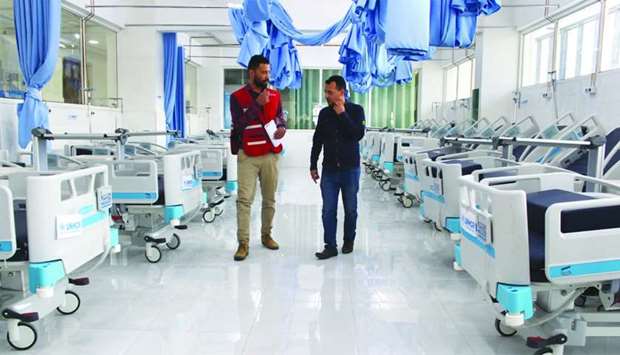Qatar Red Crescent Society (QRCS) has said it is working with the United Nations High Commissioner for Refugees (UNHCR) to back the health sector of Yemen. Accordingly, the intensive care unit (ICU) at Al-Jomhouri University Hospital in Sana'a has recently been provided with fully equipped medical beds.
Under the Refugee Health Care Support Project in Amanat Al-Asimah Governorate, 28 medical beds were procured at a total cost of $109,200 to meet the urgent needs of the hospital.
An official delegation from UNHCR and QRCS’s representation mission in Yemen visited the hospital to discuss the latest provisions and further furnishing to inaugurate the ICU department.
They promised to continue to support the hospital with medical equipment in order to serve the refugee community and population of Sana'a, as part of QRCS’s ongoing health operations in the country.
Dr Muthar Murshid, chairman of Al-Jomhouri Hospital, thanked QRCS and UNHCR for providing the hospital with high-tech medical equipment, including the new beds, with vital signs monitors to be supplied later this month to the ICU department.
“This is a significant addition to the hospital, helping meet the increasing pressure due to receiving critical cases and enhance the quality of services,” said Dr Murshid. “We hope for more assistance in providing Yemen’s hospitals with medical equipment and supplies to improve healthcare performance and outcomes at public health facilities."
Dr Mohamed al-Jaloud, health officer at UNHCR's country office, emphasised the importance of the partnership with QRCS for providing the health facilities with much-needed equipment, amid adverse conditions wherein the health authorities are unable to offer even the least services.
“We value QRCS’s huge efforts to make this upgrade in the Yemeni health sector, with funding from UNHCR,” said Dr al-Jaloud. “We wish them success in their future projects, building on our permanent partnership."
Dr Hamza al-Shaibani, the project manager at QRCS’s mission, expressed happiness at this achievement. “We are satisfied with the outcomes of the project, co-implemented by QRCS and UNHCR,” he said.
“It is an emergency support that took much time and effort to procure these beds, as the global demand skyrocketed due to the coronavirus pandemic. Today, we are gratified to see this happening, especially as there is a dire need to meet the numbers of care seekers,” Dr al-Shaibani added.
According to the hospital’s statistics centre, the new ICU department is estimated to receive 280 cases per month, or 3,360 per year. The new supplies will meet that demand by expanding the hospital’s capacity.

